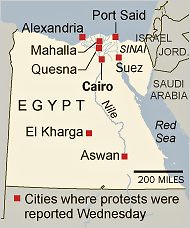
Cities and regions of the North African state of Egypt where workers struck and took to the streets on Feb. 9, 2011. The struggle in Egypt is escalating everyday., a photo by Pan-African News Wire File Photos on Flickr.
Egypt’s benchmark stock index drops for 3rd consecutive day on unrest fears
By Associated Press
Tuesday, July 12, 6:34 AM
CAIRO — Egypt’s benchmark stock index fell for the third consecutive day on Tuesday, dragged down by concerns of an escalation in tension in the country over the pace of reforms and accountability of police and former regime officials.
The decline came a day after the Finance Ministry for the first time set a new public sector maximum wage of 36 times the minimum wage — a move aimed at tackling one of the many complaints leveled by striking workers and protesters who maintain that consultants in government ministries were pulling in exceedingly high salaries.
The Egyptian Exchange’s EGX30 index was off almost 2.75 percent by about 12 p.m. local time, building on the previous day’s almost 3 percent decline. The index’s year-to-date losses have now pushed past 30 percent.
Brokers attributed the declines to investor fears about the continuing protests in Cairo and other Egyptian cities, with demonstrators calling for the removal of police officers allegedly implicated in the death of more than 950 people during the uprising that ousted former President Hosni Mubarak.
“The sales pressure shows that people are unloading because of fears about the protests,” said Ahmed Hanafi, head of research at Gothour Trading.
Hundreds of protesters remained camped in Cairo’s central Tahrir Square days after one of the largest demonstrations to besiege the capital since the former leader handed over control in mid-February to the military. The protesters are demanding, among other things, the removal of police officers accused killing demonstrators during the mass uprising. Nearly 900 people died during the uprising.
“If there’s a decision showing that people will get their rights, ... this could stabilize the market,” said Hanafi.
Foreigners dominated the selling, as did institutional investors, brokers said, and the declines covered a range of sectors.
Egypt’s market, and its broader economy, have been hard hit by the protests. Labor strikes and general demonstrations have continued five months after Mubarak’s ouster, undercutting productivity and manufacturing in the country while a general collapse in the security situation has battered tourism — a sector that generates billions of dollars in foreign currency for the nation.
Egypt’s caretaker government and the country’s military rulers are trying to accommodate a host of protester demands, many of which center on improving the livelihood of citizens of the nation in which, according to the World Bank, about 40 percent live on or below the poverty threshold of $2 per day.
Spending on social services has been boosted in the budget for fiscal 2011-2012 and a new minimum wage has been set at about 700 pounds ($118) per month for the public sector.
The finance ministry said in a statement that a salary cap amounting to 36 times the minimum wage, or 25,200 pounds ($4,270) had been set. The statement said a cap had been placed on so-called incentives or bonuses, but did not specify how much.
The move is a key part of the caretaker government’s efforts to show a commitment to narrowing an income gap that had mushroomed under Mubarak’s regime.
Egyptians complained that the core salary paid in the public sector was so low that government workers either balked at performing their jobs, or do so only with a boost in the form of bribes.
Others claimed that consultants hired at the various ministries or government offices were paid salaries that would have Wall Street brokers envious.
No comments:
Post a Comment